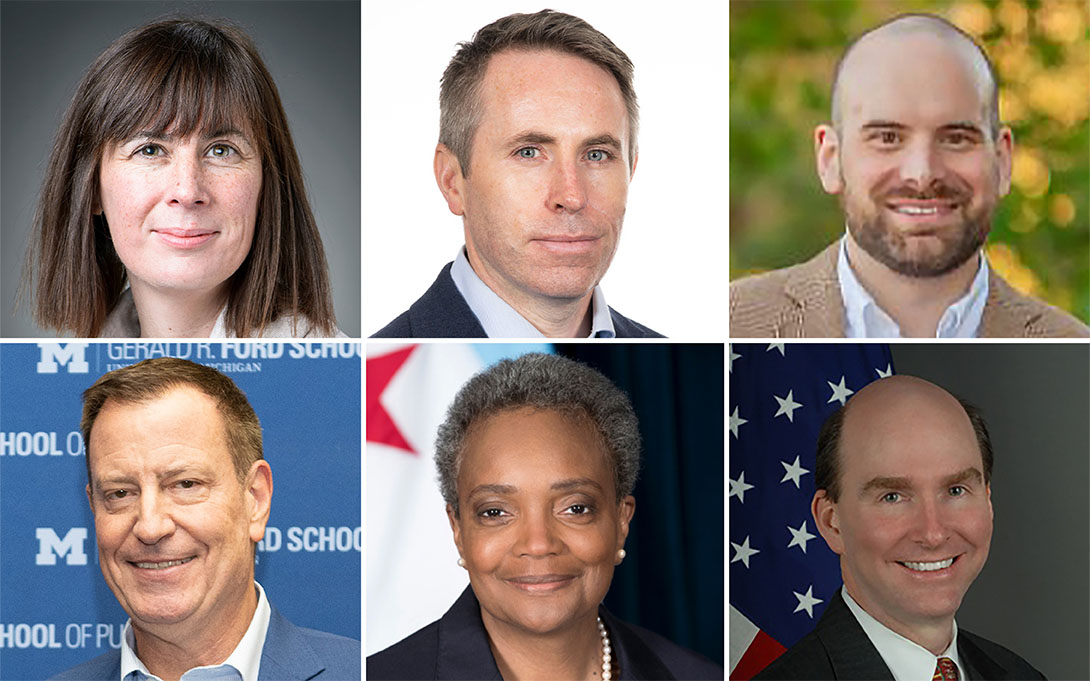
The Ford School successfully grew our faculty in 2024, bringing in experts to deepen our focus on early childhood education, health and aging, better government, and criminal justice policy. Additionally, we welcomed distinguished policymakers in residence, including two former mayors of major American cities, a former U.S. Ambassador, and a county health director.
Read more about these new experts here, and stay tuned as they teach our students how to shape and influence public policy at all levels for the public good.
New faculty
Renowned sociologist Pamela Herd joins the Ford School as the inaugural Carol Kakalec Kohn Professor of Social Policy. Formerly a distinguished professor of public policy at Georgetown University’s McCourt School of Public Policy, her research examines the intersecting issues of inequality, health, aging, and policy. An expert in survey research and biodemographic methods, Herd serves as Co-Principal Investigator for General Social Survey, an Investigator with the Wisconsin Longitudinal Survey, and Chair of the NIH Data Advisory Board for the National Study of Adolescent Health. She also examines administrative burden—bureaucratic obstacles to accessing goverment benefits and services—and their role in reinforcing inequality. Her acclaimed book, Administrative Burden: Policymaking by other Means has earned awards from the National Academy of Public Administration, the American Society of Public Administration, the American Political Science Association, and the Academy of Management.
Donald Moynihan joins the Ford School as professor of public policy. The Ford School will put Moynihan forward as the J. Ira and Nicki Harris Family Professor of Public Policy, pending approval by the U-M Regents effectiveJanuary 1, 2025. Moynihan’s research seeks to improve how government works by studying the administrative burdens people face in their interactions with government institutions. He co-directs the Better Government Lab, which explores technological and other interventions to improve access to the social safety net. Moynihan has shared his research to policymakers globally. In 2014, Moynihan received the Kershaw Award, which is given every two years by Mathematica and the Association of Public Policy and Management (APPAM) to one scholar under the age of 40 for outstanding contributions to the study of public policy and management. urrently the president of APPAM and a former president of the Public Management Research Association, Moynihan previously held the McCourt Chair of Public Policy at Georgetown University and directed the La Follette School at the University of Wisconsin-Madison.
Early education scholar Christina Weiland has been appointed the inaugural Karl and Martha Kohn Professor of Social Policy. She is also serves as co-director of the Ford School’s Education Policy Initiative. Weiland’sresearch focuses on the effects of early childhood interventions and public policies on child development, with a special focus on children within low-income households. She is particularly interested in the active ingredients that drive children’s gains in successful, at-scale public preschool programs. Her long-term research collaborations with practitioners, most notably in the Boston Public Schools Department of Early Childhood, are a testament to her commitment to bridging research and practice. Weiland has consulted on Governor Whitmer’s Universal Pre-kindergarten expansion, served as a member of the National Academies of Sciences, Engineering, and Medicine committee on preschool curriculum, and prepared policy briefings for Seattle’s City Council, senior U.S. Department of Education officials, the U.S. House Education and the Workforce Committee and the U.S. Senate Committee on Health, Education, Labor, and Pension.
University of Michigan sociologist Jeremy Levine now holds a courtesy appointment at the Ford School. An associate professor of organizational studies, Levine specializes in urban and criminal justice policy. He has collaborared with legislators and advocates in New York on ongoing legislative campaigns concerning crime victims and the criminal legal system. At Harvard, he contributed to designingthe Boston-Area Research Initiative (BARI), a partnership between social scientists and city government officials. His analyses were instrumental in helping advocates pass the Fair Access to Victim Compensation Act in New York State in late 2023. The University of Michigan LSA Magazine recently profiled this ongoing work.
Distinguished visiting policymakers in residence
Former Chicago Mayor Lori Lightfoot joins the Ford School faculty as a Harry A. and Margaret D. Towsley Foundation Policymaker in Residence. She will co-teach a strategic public policy consulting course alongside sociologist Jeffrey Morenoff. Additionally, former New York City Mayor Bill De Blasio will return this fall in the same capacity, after initially joining last winter, to continue his popular course, "When Policy Met Politics: How Real Change is Made."
Former Ambassador Daniel Shields also returns as a visiting policy practitioner at the Ford School’s Weiser Diplomacy Center. Hewill consult, lead the course “U.S. Diplomacy in the Indo-Pacific,” and conduct simulations focusing on diplomacy and U.S.-Asia relations. Wayne County Health Director Abdul El-Sayed will come back this fall as a visiting policymaker in residence, where he will instruct the course “Policy Foundations of Health.”
Ford School celebrates legendary faculty members
This fall, the Ford School is celebrating the distinguished careers of core faculty members: Paul N. Courant, Alan V. Deardorff, Edie Goldenberg, Barry Rabe, Carl Simon, Susan Waltz, and Janet Weiss. Each of them has been a trailblazer in their fields, an inspirational teacher to generations of students, and a key contributor to building the Ford School and other parts of the University into the world-class community it is today.
